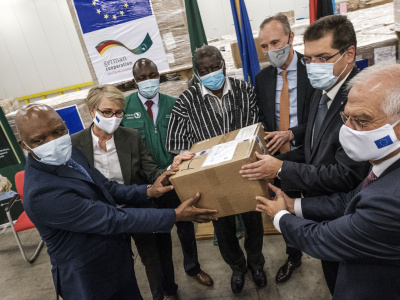
The health sector – a promising avenue for a strengthened AU-EU partnership
The sixth European Union-African Union Summit resulted in a number of commitments from both the AU and EU aiming to support the resilience of health systems. The health sector offers an opportunity to strengthen the AU-EU partnerships in a way that aligns with Africa’s objectives. In particular, it combines both short and long-term perspectives, uses existing African initiatives, institutions and mechanisms and contributes to industrialisation objectives.
The EU commitments relating to the health sector in Africa are many and cover a wide range of issues, including the manufacturing of health products, strengthening of the regulatory framework and the support to resilient health systems (see below).

If successful, such an integrated and comprehensive approach to the health sector, which builds on Africa’s own initiatives and institutions, could potentially help model future development interventions in other thematic areas of the AU-EU partnership. In particular, four issues stand out, and will be important to monitor to assess the extent to which this AU-EU partnership can be renewed, in a direction that supports Africa’s ownership and strategic autonomy, and reinforce Europe’s values and geostrategic interests.
Responding to the health crisis and adopting a long-term vision towards resilient health systems
The pandemic hit hard the national health sectors in Africa and beyond, revealing their limited resilience. Health systems lacked the necessary staff, finances, equipment and infrastructure, and were not able to provide accessible, affordable and quality health products and services to their citizens. Responding to the health crisis and strengthening the resilience of health systems has since turned into a priority for African governments, creating a political momentum.
This was echoed by European development actors which provided coordinated support under a Team Europe approach, and by the French Presidency of the Council of the EU, which made health a top priority for the EU. This momentum goes beyond the notion of emergency, and builds on a long-term vision, which is led by African priorities and interests, in partnership with European actors. This is emphasised in both the joint vision, adopted by the EU and AU after the summit in February 2022, and the outcome text of a high level side-event on ‘Making quality health products accessible to all.
Strengthening health system resilience by working through African mechanisms
The commitments around the EU-AU Summit recognise the importance of supporting and working through African health related institutions and mechanisms, at the continental, regional and national levels. Together with Team Europe and other development partners, such as the Bill and Melinda Gates Foundation, the EU committed to mobilising over €100 million to support the first implementation stages of the African Medicines Agency (AMA), and to strengthen other African medicines agencies initiatives at regional and national levels.
Funding, collaboration and knowledge-sharing are also put forward to reinforce the capacities and the autonomy of African institutions. This approach is in line with the long-term vision of strengthening the resilience of African health systems, and will help achieve a sustainable change within the sector. EU support at the different levels should be coordinated and complimentary if it wants to be effective.
Building productive capacity to support Africa’s industrialisation
As emphasised in our recent policy brief, supporting the health sector is not only about supporting the regulatory framework, but also about boosting the capacity of African countries and regions to manufacture health products, including vaccines. In this regard, African actors as well as EU development partners give particular attention to end-to-end (vs. fill-and-finish) production, to leapfrog into sustainable innovation such as mRNA, that could support the health of future generations.
In this regard, six countries were selected for the World Health Organization’s mRNA technology transfer at the EU-AU Summit. One example is the Team Europe initiative in Senegal, where the Institut Pasteur of Dakar will host a regional manufacturing hub for vaccines, that will also facilitate access to, and transfer of technologies. Importantly, the support provided is comprehensive, touching upon strengthening productive capacities (through financing project preparation, manufacturing plants etc.), supporting the capacities of the national and regional regulatory agencies, and fostering skills development.
While it is too early to assess progress, such interventions can directly contribute to African industrialisation objectives, in line with the African Continental Free Trade Area. They can help diversify global value chains (and the economy), engage the private sector, support trade and in doing so, contribute to human development and well-being.
Developing an approach combining health and economic transformation
Because of its inherent complexity, strengthening health systems resilience requires an holistic, coherent and integrated approach, tackling different policy areas. It is not sufficient to foster the supply of quality health products. Infrastructure will not be sustainable if the demand for health products is not supported through market consolidation, for example, based on the regional harmonisation of standards and better transport and logistics. This understanding and approach are reflected in the support package put forward by the EU, which focuses on:
- Pharma manufacturing productive capacities with the Team Europe initiative on manufacturing and access to vaccines, medicines and health technologies in Africa (MAV+)
- Regulatory environment & standard harmonisation with the EUR 100 million to support African Medicine Agency
- Health systems and universal health coverage: with a EUR 500 million pledge by the EIB to strengthen health systems
In the implementation phase, African actors and development partners will need to pay attention to the coordination between the different interventions (and actors). It will be interesting to see how this coordination materialises in practice and what lessons learned could be transferred to governments and development partners involved in other sectors. There is little doubt that this approach – albeit challenging – could contribute to a truly renewed AU-EU partnership, one that strengthens each party and shifts away from dependency links.
The views are those of the authors and not necessarily those of ECDPM.





